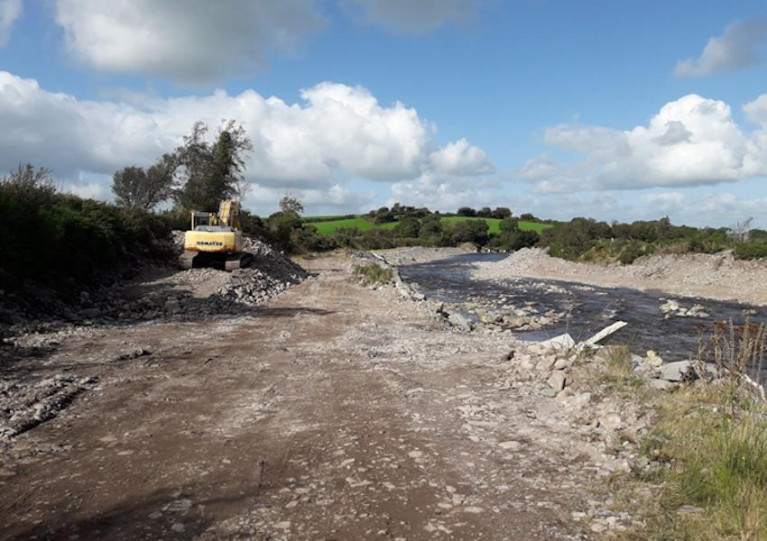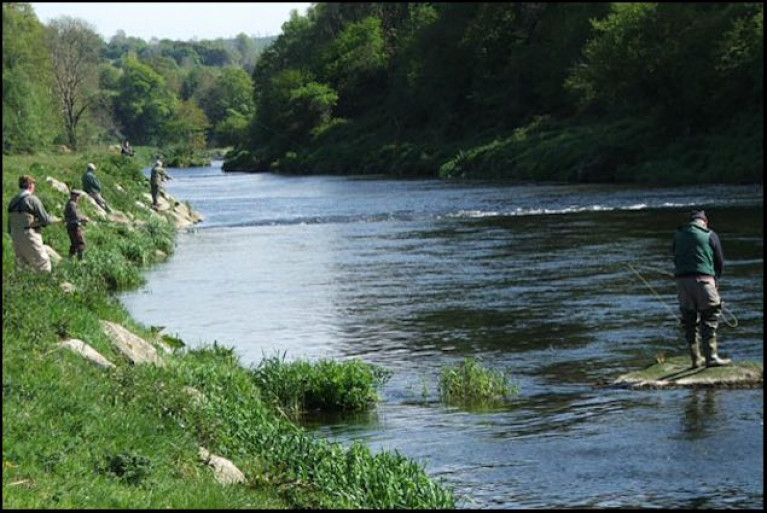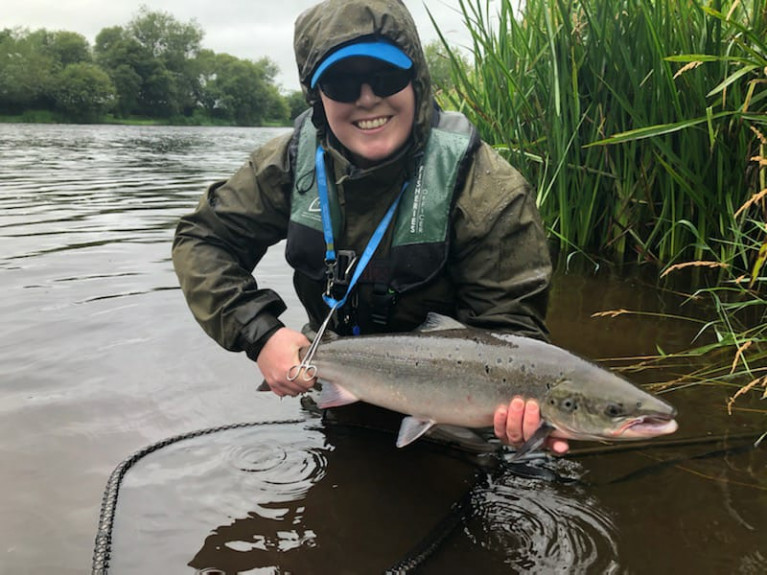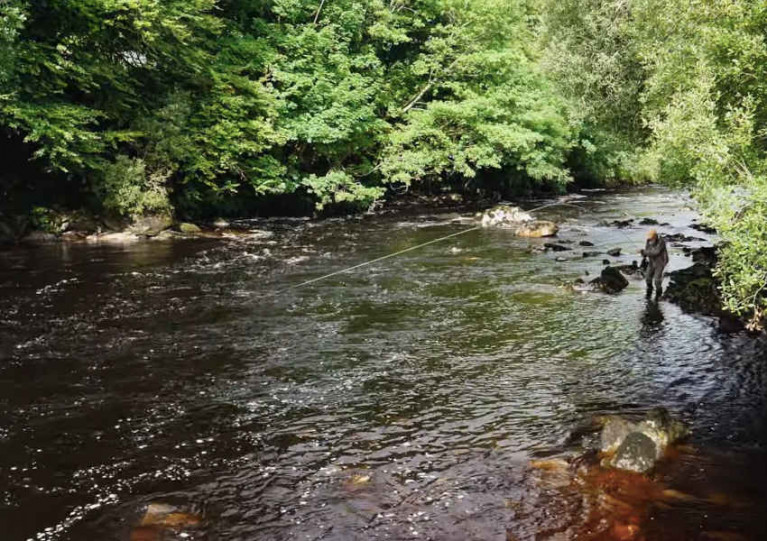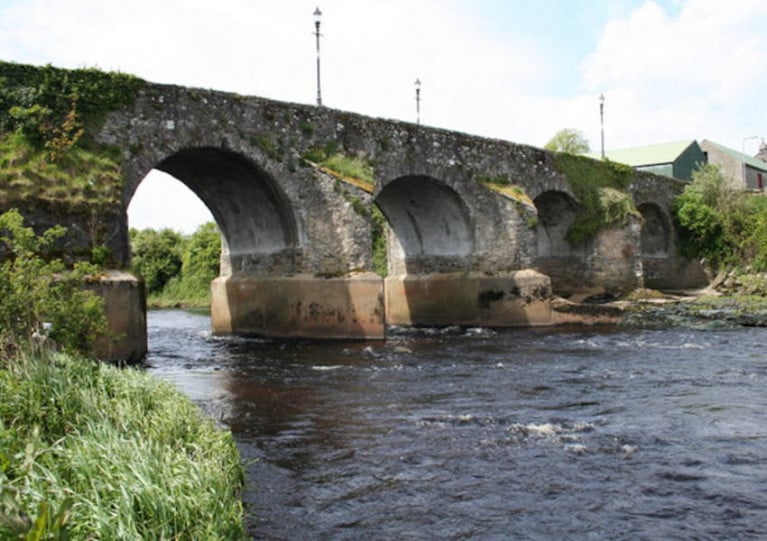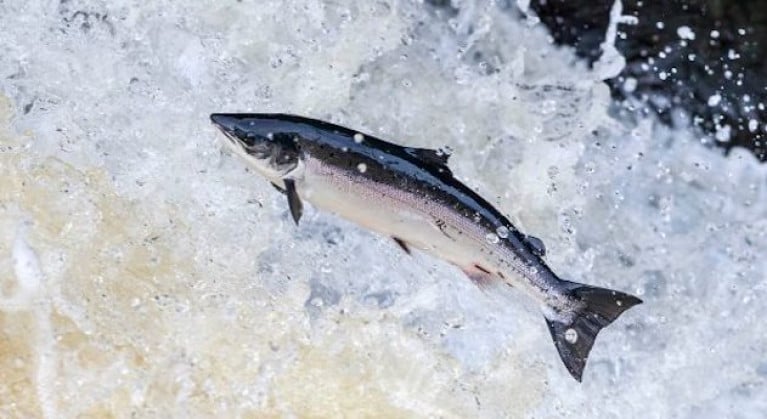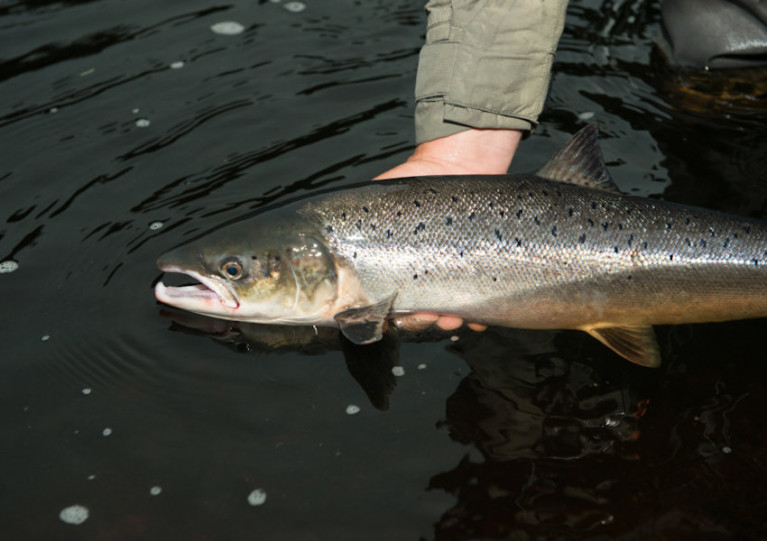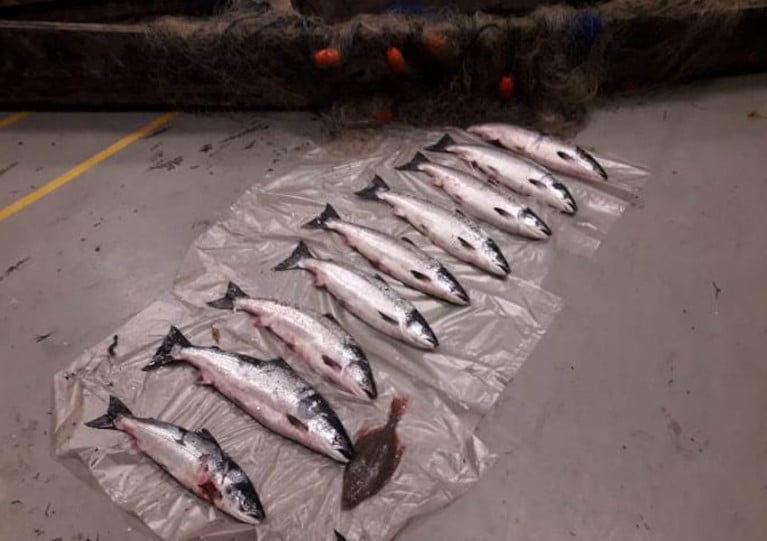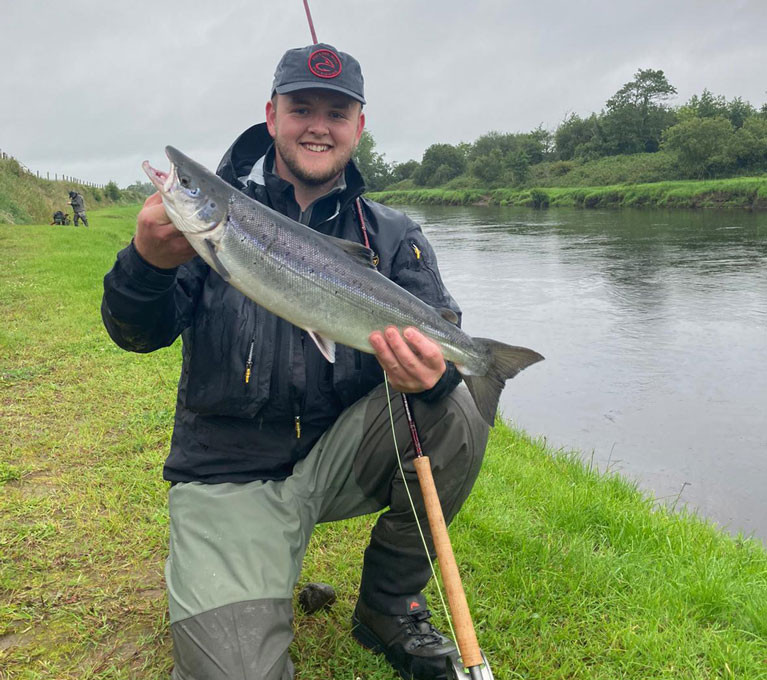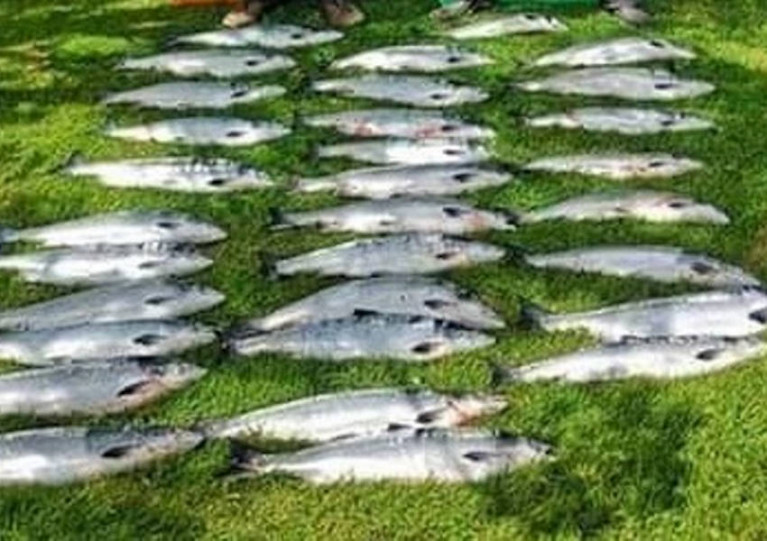Displaying items by tag: Salmon
A farmer from Beaufort in Co Kerry was convicted and fined €3,300 plus costs following a prosecution taken by Inland Fisheries Ireland (IFI).
In a hearing at Caherciveen District Court on Thursday 10 December, Judge David Waters convicted Raymond Breen under Section 173 (d) of the Fisheries Consolidation Act 1959 for carrying out works in the Gaddagh River which damaged sensitive spawning beds.
While a charge of obstruction was struck out, Judge Waters commented that he could not ignore the defendant’s behaviour when considering the appropriate penalty.
The Gaddagh River, a tributary of the River Laune and in a Special Area of Conservation (SAC), is an important spawning habitat for Atlantic salmon, a species protected under Irish and European law.
The court heard evidence that an inspection carried out by IFI fisheries officers discovered substantial amounts of spawning gravel removed from the river and stock-piled along a 250m section of bank.
Heavy machinery tracks were recorded across the riverbed, the protected spawning gravels and on both banks.
Evidence was given that the engine of a tracked earth-mover at the site was hot when discovered but the driver could not be located. The scene was described in court as a “working site”.
Sean Long, director of the South Western River Basin District at IFI, said: “This is a serious environmental crime. The removal of gravel from spawning beds will directly impact our already endangered Atlantic salmon stocks by drastically reducing usable spawning gravel.
“We urge all landowners to take responsible action and to contact their advisors or Inland Fisheries Ireland before carrying out any works that may damage watercourses on or adjacent to their land.”
83 Rivers Open for Salmon Angling in 2021
Eamon Ryan T.D., Minister with responsibility for the Inland Fisheries sector has approved legislation that will govern the wild salmon and sea trout fisheries in 2021. These will come into effect from Friday 1 January 2021.
Minister Ryan said, “We are opening 83 rivers for salmon and sea trout fishing in 2021. This will allow careful management of this important natural resource, for which conservation will be to the fore.
In a positive trend, forty-nine of the rivers will be fully open, an increase of 20% on 2020, with a further thirty-four available on a ‘catch and release’ basis. Continued movement in a positive direction is only possible over time and is entirely dependent on everybody redoubling our conservation efforts in the face of environmental, climate and human impacts.”
"In a positive trend, forty-nine of the rivers will be fully open, an increase of 20% on 2020"
To inform the legislation for 2021, Minister Ryan received management advice from Inland Fisheries Ireland in relation to over 140 genetically individual wild salmon stocks in Ireland, which in turn was considered in the light of individual scientific assessments. The assessments were carried out by the Technical Expert Group on Salmon (TEGOS) an all-island independent scientific group comprising experts from a range of bodies.
This advice was also made available as part of a statutory public consultation process during which 33 written submissions from stakeholders were received.
Management advice based on the TEGOS assessment of rivers/estuaries/harbours is that:-
- 49 rivers to be open as a surplus of fish has been identified in these rivers;
- 34 rivers to be classified as open for “catch and release” angling; and
- 64 rivers to be closed as they have no surplus of fish available.
Minister Ryan said, “Ireland is internationally recognised for prioritising the conservation imperative as fundamental to our salmon management efforts and our contribution to the continuing global initiative that is the International Year of the Salmon 2020 has been second to none. Environmental and climate change and human impacts continue to place salmon and other species at risk. I am determined that the innovations of International Year of the Salmon, which continue to bring people together to share knowledge and raise awareness, will endure. This is key to ensuring the resilience of salmon in Ireland and in the entire North Atlantic”.
New Wild Salmon & Sea Trout Fisheries Legislation in 2021
Wild Salmon and Sea Trout Tagging Scheme (Amendment) Regulations S.I. No. 667 of 2020
These regulations provide for, the quotas of fish that can be harvested by commercial fishing engines and rod and line from those rivers identified in Schedule 2. The Regulations also provide for the use of brown tags in specified (low surplus) rivers which are identified in Schedule 4.
Angling Bye-law No. 982 of 2020
This Bye-law prohibits the use of any fish hooks, other than single or double barbless hooks, and also prohibits the use of worms as bait in angling for all species of fish in the waters specified in the Bye-law. This is to avoid the use of hooks and baits which are not conducive to fish survival and to ensure that the objective of C&R fishing is not frustrated.
Conservation of Salmon and Sea trout (Bag Limits) Bye-law No. 983 of 2020
Provides for an annual bag limit of 10 fish being either salmon or sea trout (over 40 cm) per angler and provides for a season bag limit of 3 fish in the period 1 January to 11 May, a daily bag limit of 3 fish from 12 May to 31 August and a daily bag limit of 1 fish from 1 September to the end of the season. The Bye-law also provides for the use of single or double barbless hooks and prohibits the use of worms as bait once the specified numbers of fish have been caught in the specified periods.
Conservation of Salmon and Sea trout (Catch and Release) Bye-law No. 984 of 2020
Provides for catch and release in respect of salmon and sea trout (over 40 cm) in rivers that are meeting at least 50% of their Conservation Limit as mentioned in the Bye-law. The Bye-law also provides for the use of single or double barbless hooks and prohibits the use of worms as bait in angling for salmon and sea trout over 40 cm.
Conservation of Salmon and Sea Trout (River Suir) Bye-law No. 986 of 2020
This Bye-Law provides for catch and release in angling for salmon (any size) and sea trout (over 40cm) in the River Suir (including the waters of the Rivers Clodiagh, Lingaun and Blackwater) and also prohibits the use of worms, prawn, shrimp or any other crustacean, or artificial forms thereof, as bait and any fish hooks other than single or double barbless hooks during the period 17 March to 30 September.
Conservation of Sea Trout Bye-law No. 987 of 2020
This Bye-law provides for a daily bag limit of 3 sea trout (less than 40 cm in length) and provides for the use of single or double barbless hooks and prohibits the use of worms as bait once the specified number of sea trout have been caught.
Conservation of Salmon and Sea Trout (River Slaney) Bye-law No. 985 of 2020
This Bye-Law provides for catch and release in angling for salmon (any size) and sea trout (over 40cm) in the River Slaney and also prohibits the use of worms, prawn, shrimp or any other crustacean, or artificial forms thereof, as bait and any fish hooks other than single or double barbless hooks.
Conservation of Salmon and Sea Trout (Closed Rivers) Bye-law No. C.S. 331 of 2020
Prohibits the taking or attempting to take by rod and line salmon and sea trout (over 40 cm) in the rivers specified in the Bye-law.
Salmon & Sea Trout Angling Licences for 2021 Now Available
Inland Fisheries Ireland (IFI) has reopened its sales of salmon and sea trout angling licences for the 2021 season.
E-licences can now be purchased online and will be delivered along with a logbook straight to your phone or computer. Gill tags will be dispatched by post.
There is no price change for salmon and sea trout angling licences this year and licence fees will remain the same across all classes, including those for juvenile anglers.
Anglers are legally required to be in possession of a licence and logbook when fishing for salmon or sea trout. Online licences must be printed off along with the logbook and in the possession of anglers while fishing.
For anglers who require tags on or before Tuesday 5 January, online licences must be purchased on or before Monday 21 December.
Alternatively, angling licences will be available to purchase from approved licence sales distributors from the end of December/early January.
For those anglers who do not require tags in advance of 5 January, online licences and logbooks will be available from the IFI online shop throughout the Christmas period.
Anglers are advised to comply with Government guidelines specific to the region in which they live and wish to travel to. IFI has published updated advice for anglers, who are also reminded to check before travelling as due to Covid-19, working arrangements for distributors and fisheries may have changed.
IFI chief executive Francis O’Donnell said: “We are happy to announce the opening of 2021 licence sales for salmon and sea trout angling. We would like to use this opportunity to recognise the contribution salmon and sea trout anglers make to the sustainability of the resource by paying their licence fee and supporting the Salmon and Sea Trout Rehabilitation, Conservation, and Protection Fund as a result.”
The costs for salmon licences will remain as follows:
- All Districts (ie all Regions) Annual: €100
- Juvenile (under the age of 18 years) All Districts Annual: €10
- One District, Annual: €56
- All districts, 21 Days: €40
- All districts, 1 Day: €20
- Foyle Area Extension: €80
IFI also reminds all salmon and sea trout anglers to return their 2020 angling logbook and unused gill tags as soon as possible, even if there is no catch recorded.
Anglers are asked to make the return via the business return envelope which was supplied at the time of license purchase. Otherwise, anglers can return their completed logbook and unused tags to the IFI office address on their licence/logbook.
These returns will provide vital information regarding the status and management of our wild Atlantic salmon and sea trout stocks for the future.
Foyle & Carlingford Anglers Urged to Make 2020 Catch Returns to Support Scientific Research
The Loughs Agency is reminding anglers in the Foyle and Carlingford areas to log and submit their angling effort, catches and releases for the 2020 season.
Rod licences for salmon and sea trout in Foyle and Carlingford come with a legal obligation to inform the Loughs Agency (via the eLicence web portal) of how many times the licence holder went fishing and got many fish they caught.
To date, the agency says less fewer than 10% of anglers have made their return for the 2020 season.
For the 2020 season, the Loughs Agency will be carrying out an in-depth study of catch returns and angling effort to determine fish runs in rivers, number of fish caught, weight of fish caught and/or released, and how much time anglers put into catching those fish.
As a result, anglers are encouraged to make their return and be as accurate as possible with locations, dates, weights, species, methods and time spent fishing.
The deadline for catch returns is Thursday 21 January 2021.
Bogslide Threat to Important Salmon River in North West
Anglers in Donegal and Tyrone fear a recent bogslide near Ballybofey has made an important salmon river uninhabitable for fish.
Footage of the peat slippage on Mourne Beg at the Donegal/Tyrone border, which went viral on social media over the weekend, shows some of the thousands of tonnes of bogland that slid into the River Derg system.
And according to BreakingNews.ie, a local angling representative said one dead fish had already been found ahead of more they expect to discover in the coming days.
Peat slippage near Meenbog Wind Farm, south of Ballybofey in Donegal. #Meenbog ? pic.twitter.com/YEQSLMfqQ7
— Mark Rooney (@rooneymobile) November 14, 2020
The Loughs Agency said its staff are “evaluating the environmental effect” of the incident along with Donegal County Council and other agencies.
Captive Salmon "Not a Substitute" for Wild Spawners, Research Suggests
New research led by scientists at University College Cork (UCC) which uses genetic fingerprinting techniques indicated that captive-born salmon are far less successful at reproducing as wild salmon spawning in the same river.
“We looked at the lifetime reproductive success of salmon spawning naturally in the wild,” joint lead author of the study Ronan O’Sullivan of UCC ‘s school of biological, earth and environmental sciences said.
“ So for each adult fish that returned to the river from the sea, we counted up the total number of offspring they produced across their lives that themselves survived to spawning age,” he said.
“We used a genetic pedigree coupled with four decades of salmon data from the Marine Institute’s research facility on the Burrishoole catchment in County Mayo. The results show that captive-bred fish that are deliberately or inadvertently introduced into the wild contribute fewer offspring to the next generation than wild fish, and therefore are not a substitute for natural wild spawners,” he said.
“Thus, they do not enhance the conservation status of naturally self-sustaining salmon populations,” he said.
Dr Paul Connolly, Marine Institute of Ireland chief executive officer said that his organisation welcomed the use of Marine Institute data to “answer a question of international significance that is relevant to conservation efforts for the culturally iconic Atlantic salmon”.
“ This analysis underlines the importance of having long–term biological data to allow management decisions to be based on the best available scientific evidence,” he added.
Further research is needed to work out exactly what is happening when the wild and captive salmon mix, UCC says.
However, it says the research team suspects that hybrid offspring produced by matings between captive and wild parents are genetically less well-equipped to deal with life in the river.
If true, this means that the widespread release of captive animals into the wild might actually do more harm than good in many cases, UCC says.
It says the research team comprised an international group of collaborators based at University College Cork, the Marine Institute, Queen’s University Belfast, the University of Helsinki and the University of Edinburgh. Their research findings are published in the prestigious journal Proceedings of the Royal Society B.
The research is available freely via Open Access here
The Loughs Agency is calling on anglers in Foyle and Carlingford areas to take immediate steps to ensure sustainability of their wild salmon fisheries.
It comes after the latest State of the Salmon report, published by the North Atlantic Salmon Conservation Organization (Nasco), highlighted the continuous and worrying decline in Atlantic salmon populations.
According to Nasco: ‘It now takes about double the amount of eggs to produce one adult (compared to 1990s) that will return to that same river to spawn — an indication of the multiple pressures facing the species throughout its complex life cycle.”
This decline is reflected in our local rivers and we are calling on anglers to take immediate steps to ensure sustainability of the fisheries of Foyle and Carlingford.
The Loughs Agency is asking anglers to play their part in conserving and protecting these important fish, based on the latest scientific guidance. Anglers are encouraged to:
- Update their catch return and fishing effort regularly and throughout the season on the elicence website. This data is used to help manage the fishery using real-time data. Last year only 7.5% of anglers made a return.
- Keep the 24-hour Loughs Agency Response Line telephone number +(0)44 2871 342100 as a contact on their phone and report any concerns directly and promptly.
- Practice catch and release. Many anglers already do this, with around 42% of anglers not taking carcass tags when they purchase their licence.
- Implement biosecurity measures to prevent the spread of invasive plants and animals.
- Reduce the number of fish taken from the system by complying with the reduction in carcass tags. For the 2020 season the Loughs Agency is issuing a maximum of one blue tag (1 March to 31 May) and two black tags (1 June to 31 October). Tackle shops have been instructed not to issue more than these maximum quantities for the 2020 season.
As the fishery authority for Foyle and Carlingford, the Loughs Agency also plays a vital important role as a steward of key cross-border natural resources.
The agency is undertaking reviews — of legislation, angling development and more — to ensure that its priorities are informed by evidence, particularly in relation to scientific evidence gathered for conservation and protection.
Input will be sought from angling stakeholders on a number of key areas, such as conservation, real-time fisheries management, development of angling and legislation, via a consultation process in due course.
Firearm Discharged In Seizure Of Illegal Salmon Net On River Suir
A firearm was discharged by alleged offenders as fisheries officers responded to reports of an illegal net on the upper tidal River Suir late last month.
Nobody was injured in the incident as Inland Fisheries Ireland officers seized a boat, net and nine wild salmon near Carrick-on-Suir during a routine patrol on the night of Tuesday 28 July.
Gardai attended the scene and the matter is being investigated, the fisheries body adds.
IFI director David McInerney said: “The salmon caught by this illegal net were on the final leg of an arduous journey to reach their native spawning rivers.
“The fish were fresh in from the sea, having survived a journey from either the coastal waters off west Greenland or the Faroe Island, before being cruelly killed by an illegal net, a few miles from their final destination.
“It cannot be stressed enough that nobody should purchase wild salmon that does not carry either a green or white gill tag through the mouth and gill clearly displaying the name Inland Fisheries Ireland.
“I would like to highlight the dedication and courage demonstrated by the officers in tackling illegal fishing in the face of significant personal danger.”
Wild Atlantic salmon are returning in “record” numbers to rivers along the Atlantic seaboard, according to fishery managers.
As The Sunday Times reports, Inland Fisheries Ireland regional director Francis O’Donnell says this year’s season appears to have “bucked the trend”.
Mr O’Donnell, who has responsibility for the western river basin district, said there were high numbers of healthy fish on Galway’s Corrib system, Mayo’s River Moy and Ballisodare in Sligo
IFI is deploying extra patrols to detect poaching, and inspecting premises ashore, he said. Fish are believed to be fetching between 50 euro and 90 euro per salmon.
 Michael Mahnke - With a morning's catch from Mount Falcon river Moy in July 2020
Michael Mahnke - With a morning's catch from Mount Falcon river Moy in July 2020
However, scientific expert Dr Ken Whelan, director of the Atlantic Salmon Trust, urges caution on the numbers.
Commercial driftnet fishing for wild salmon in Ireland was banned in 2007, and license holders were offered a small compensation package by the then government.
“It’s not just the numbers returning this year, but the size and good condition of the fish,” Alan Maloney, owner of the Mount Falcon Hotel in Co Mayo, said.
The hotel has a two-mile stretch of the River Moy, and anglers caught 290 fish in July, he said.
Dr Whelan said that he was aware of the reports, but cautioned that “one good salmon season” does not necessarily suggest a positive trend.
 David Morris playing his first-ever fly caught salmon Mount Falcon River Moy in July 2020
David Morris playing his first-ever fly caught salmon Mount Falcon River Moy in July 2020
“We will really only know what is happening after scientists from Norway, Iceland, Scotland and Ireland meet in the autumn,” he said.
Read more on The Sunday Times report here
The hospitality industry and general public alike have been reminded not to purchase illegally caught salmon or sea trout after illicit nets were seized on a fishing boat off Cork last week.
Fisheries protection officers with Inland Fisheries Ireland (IFI) boarded the vessel off the Cork coast last Monday 13 July on which they seized 98kg of salmon and 256 metres of illegal net.
IFI notes that the incident was one of several that took place earlier this month, with similar seizures in Donegal and Mayo.
“The risk of targeted netting of salmon at sea remains the highest priority for our protection staff, who have seized 15 nets in the South Western River Basin region so far this season,” said IFI’s deputy chief executive Dr Greg Forde.
Only salmon or sea trout that have been caught by licensed commercial salmon fishermen may be sold to the public and hospitality industry, and must bear a colour coded green or white gill tag — or for wild imported salmon, a yellow tail tag.
Anglers are prohibited from selling any salmon or sea trout caught by rod and line. In addition, rod-caught salmon must have a blue tag affixed, IFI added.
Fisheries officers carry out regular inspections of premises to deter the illegal trade of salmon and sea trout. Reports of suspected illegal activity can also be made directly to IFI staff or on the confidential hotline at 1890 34 74 24 or 1890 FISH 24.


























